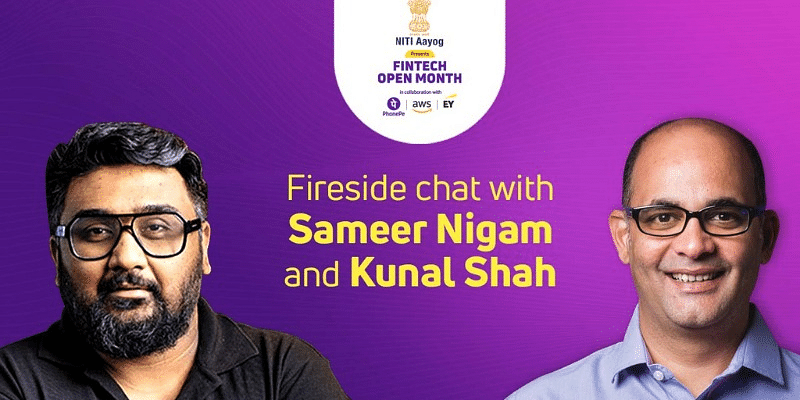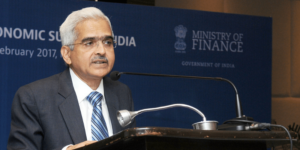Relying on technology amidst the pandemic
Drawing attention to how COVID has affected day to day lives in general, Kunal iterated that in today’s times, everything from getting food delivered to our doorsteps, booking vaccination appointments online to tracking our loved ones’ whereabouts, technology has seamlessly integrated into people’s lives. He went on to emphasize that what COVID has ensured is that every single business in today’s times becomes a tech business and we are gradually entering a world that is leaning more towards technology and doing things digitally.
Focusing on the inclination towards digital technology that has been triggered by the pandemic, Kunal further went on to say that when it comes to trusting a digital product as compared to a physical product, we have entered a rather interesting era! These days, people find it easier and more convenient to just pick up their phones and order something online rather than physically visit a branch or store to do the same.
This behaviour has permeated to more people for two specific reasons. The first reason is that it is significantly more efficient and less time-consuming and the second reason is that the younger generation is slowly inclining more and more towards text based chats instead of conversations on phones.
The future of Fintech
Talking about what the future holds for fintech, Kunal highlighted that when it comes to depositing money, he would place his trust in decade-old or century-old institutes, whereas when it comes to borrowing, he would always go with the more convenient option. For example, in terms of withdrawing money from an ATM, one would always prefer to do so from the nearest ATM machine regardless of which bank it is.
The same theory applies to purchasing any product in the market. People are always looking for the most straightforward way of getting things done. Whether it is online shopping, booking a cab or purchasing insurance, people will place their trust in products that are easily available online instead of purchasing something that needs convincing.
Furthermore, emerging spaces such as cryptocurrency are gaining popularity. The behaviour that users have demonstrated towards these concepts is super interesting and speaks volumes about emerging investment trends. With that in mind, people are now starting to consider things like regulations around crypto, which again is an indicator of the changing behavioural pattern of consumers. They are adapting to these new scenarios way more effectively making way for them to be more efficient.
The future of fintech is relying massively on human values and those are what will shape the way ahead, more than just product innovation.
Disrupting technology barriers and using data at hand
Adding to that, Sameer further elaborated on the role COVID has played in all the disruption. These days, conventional institutions are transforming their ways. Multigenerational business houses are becoming a part of the digital ecosystem with their own mobile apps, thereby making consumers’ lives easier.
Technology barriers have been blown away in the last four or five years with data and information becoming more and more accessible. This is followed by industries relying more on the data at hand to come up with strategies for the future to satisfy consumer needs. With things going digital, in today’s date, getting access to any information has become super seamless, thanks to regulators who have played a major role in providing access to said information.
Highlighting the importance of using the available data, Sameer further added that analysing the information at hand is crucial to understanding product trends and determining what works best for the company. Startups these days are also following the same mantra, thereby revolutionizing the way ecosystems are shaped in today’s day and age.
Talking about investing in startups, Kunal said that he is supportive of new emerging startups simply because he believes in fostering an environment of growth. He adds that value investing is something that will help shape the world and so he always supports new companies so they become an engagement feature in his life.
Capital liquidity and the road ahead for entrepreneurs
The aggressive market corrections and fluctuations have sparked a question for young entrepreneurs and businesses. What does the next two to three years look like considering the down cycle in the market? What are the opportunities that lie ahead?
Kunal elucidated that market down cycles and fluctuations are something that we have experienced in the past and so they don’t come as a surprise anymore. He considers this time period to be lucrative, less distractive, with less scope for capital sloshing around, and less chances of people making any sort of financial mistakes.
He lists down two things that people should be mindful of in this time period.
- CEOs and founders of companies should have enough runway to recover from such cycles. A runway of three years is ideal in his opinion.
- A downwards market trend requires one to build on available assets since there is less inflow of money. This is the time for hustling and companies should make the most of it.
He further stated that talent from banking and insurance industries are moving towards the fintech space, which is quite an exciting development.
Sameer highlighted that the availability of capital and the knowledge that digital is the future is what is fueling the functionalities of many startups in today’s times. Increasingly passionate entrepreneurs are entering the fintech space and even though catering to a population as large as India is quite the challenge, there is a growth of competitive players in the market.
On staying connected in a pandemic world filled with lockdowns, masks and social distancing, where working remotely has become the new norm, Sameer opined that because of the lack of face-to-face interaction with customers, there will be a lack of intuition which is best built on experience, something that can only be achieved through communicating with other individuals in person.
How then, do people stay connected to the grassroots where the market is at?
Kunal elaborated on the topic by saying that companies will have to start building certain mechanisms when it comes to two kinds of interactions – one with customers and the other with leadership within the organisation.
These mechanisms will aim to break the prejudices that people hold and have against their customers in a virtual world.
Kunal further said that another reason for his investing in startups is that it kills biases. The deciding factor on what works and what does not work ultimately comes from experience, exposure and knowledge. Hence, to break these barriers, companies will be required to develop such mechanisms which foster growth if we move on to a completely virtual world.
Talking about the under-penetrated spaces in India, Sameer highlighted that lending and insurance are both in demand but the education and awareness around both can be worked upon and improved.
The lack of insurance created a global level carnage during the onset of COVID-19 and it pushed many people back to poverty. During times like these, it is of utmost importance that one has an insurance policy to fall back on. However, despite there being insurance advertisements and insurers promoting their products on multiple channels, there still seems to be a gap when it comes to actually purchasing an insurance policy.
This inertia as a problem needs to be tackled through financial education at a grassroot level. People need to be made aware of how to be financially healthy while protecting themselves against any unfortunate emergencies. Once this problem is addressed efficiently, it will carve a path for all the right frameworks to fall into place and we will automatically see that in the consumer behaviour.
To this, Sameer added that the market currently is saturated with insurance advertisements and promotions. Therefore, a fresh marketing perspective could be just the thing that was missing. Promoting peace of mind and happiness without tension is one approach that PhonePe has taken in the past. In his opinion, people in today’s age will not think twice before investing in their own peace of mind, so that is one sustainable approach one can adopt with respect to insurance.
Kunal further added to this by saying that the fundamental, underlying problem in India is a lack of motivation which can be addressed with transparent financial awareness amongst all classes. He brings focus to women and how the insurance sector does not see a lot of involvement from that category. Unless women are actively participating in financial matters, a shift in the way things happen will be difficult to achieve.
With UPI slowly becoming the bread and butter for many households and women slowly taking the same route, Sameer opines that we are certain to have a pretty vibrant ecosystem in the coming years. It would be interesting to see FinTech observing and analysing the needs and patterns of women across various segments in India. That would be the biggest achievement towards financial inclusion.
Market Insights by Kunal for CRED
When talking about CRED and the very niche cohort it caters to, Kunal says that his product is aimed to solve problems for people that have a higher disposable income and want some sort of stratification in their lives. This cohort consists of people who understand the difference between a good product and a bad product. They appreciate consistency and experience and lastly, they expect things and products to be more refined.
In the last segment, when pondering over the next 10 years of FinTech, Kunal muses that the rate at which evolution of technology is taking place, we are more likely to witness a revolutionary adaptation to all things digital sooner rather than later. Products designed to cater to every cohort, to solve customer’s pain points are going to be the talk of the town in the coming years. On advising startups of today’s day and age, Kunal highlighted the value of starting a company that solves customer problems efficiently. Hence, new companies should focus more on that aspect instead of just raising funds.
Sameer concluded with the following key takeaways for startups:
- Build a company that is solution oriented. If one is solving problems, financial support typically follows suit.
- There is a lot of capital in the market, entrepreneurs just have to go out there and grab the opportunity with their products.
- There is an unprecedented opportunity for young entrepreneurs to cater to the needs of a billion people.










